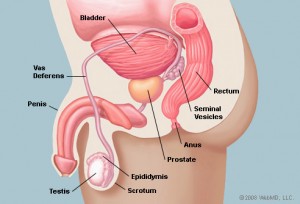In Your Undies: Tips for Prostate Health
So much attention is given to women and caring for what is in their undies and bras. Breast health, cervical checks, etc are promoted far and wide. Just as important, however, is what is in a man’s underwear.
Today we look at prostate health – what it is, and why it is so important for men to be aware and to be proactive.
What is the Prostate?
The prostate is a male reproductive glandular organ located at the base of the urinary bladder. Approximately the size of a walnut when healthy, the prostate encases the urethra. The function of the prostate gland is to produce seminal fluid which protects and feeds sperm.
Men commonly experience changes to the prostate gland as they age, including enlargement or inflammation, and these can lead to urinary problems. The prostate undergoes a growth spurt at puberty and another when men are in their thirties. The gland continues to enlarge to double its original adult size by age seventy.
Common Symptoms of Prostate Problems
Issues with the prostate can be benign or cancerous; the vast majority of issues have benign causes but prostate cancer is quite common as men get older. Symptoms which can occur as a result of prostate enlargement (hyperplasia), inflammation, or cancer include:
• Frequent need to urinate day or night
• Urgent need to urinate
• Slow, sluggish, or sporadic urine stream
• Dribbling after urination
• Sensation that bladder has not emptied
• Lack of force to urine flow
• Inability to urinate
• Painful urination
• Blood in the urine
• Penis discharge
• Incontinence
Inflammation of the prostate gland can also cause:
• Fever
• Pain in lower back or groin
• Urgent or frequent urination
All of these symptoms need to be addressed with your doctor.
How Can You Keep Your Prostate Healthy?
• Maintain a Healthy Weight
• Eat plenty of fresh fruit and vegetables. Tomatoes, pink grapefruit, watermelons and guava are particularly good for the prostate.
• Be aware of and advise your doctor if you have a family history of prostate cancer
• Don’t smoke
• Include soy in your diet
• Eat selenium-rich foods including tuna, shellfish, eggs, beef, mushrooms, garlic and onions.
• Beginning by age forty-five, have a regular PSA blood test and digital rectal examination; this should be done annually after age fifty.







